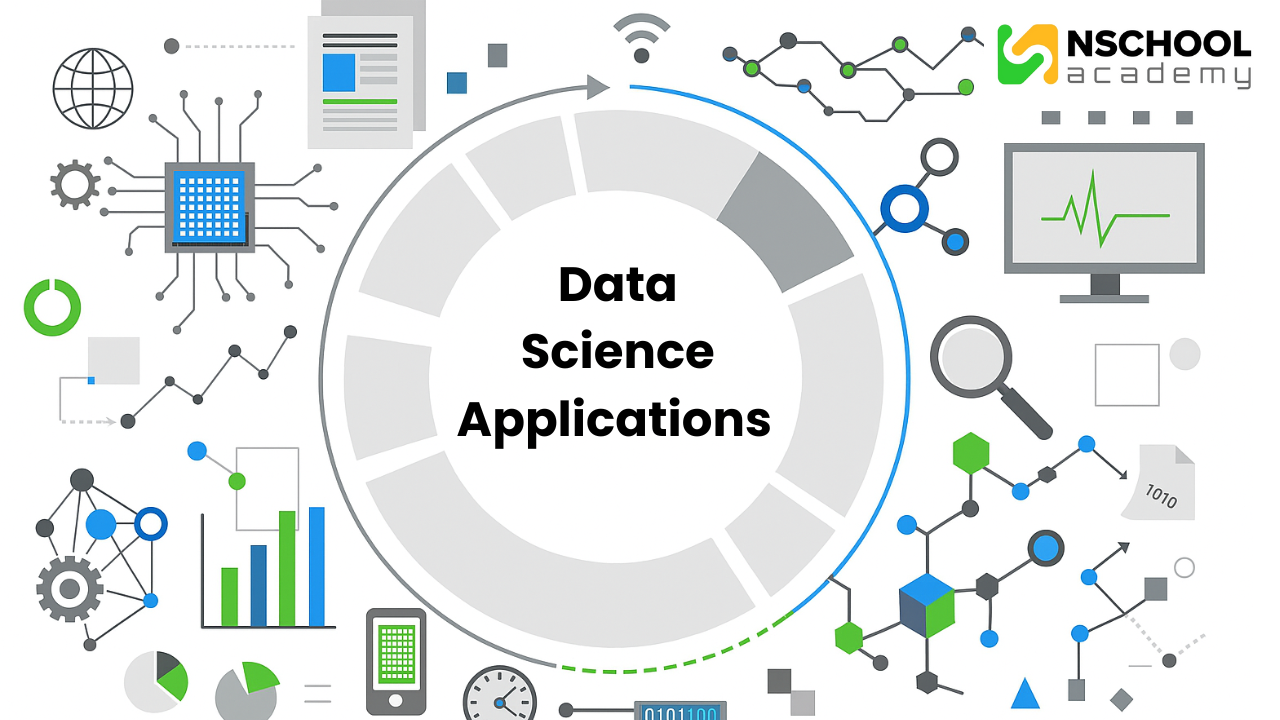Data Science Applications
- May 3, 2025
- nschool
- 0

Introduction
In the modern digital era, data science applications are revolutionizing industries, decision-making processes, and even our daily lives. As the volume of data continues to grow exponentially, so too does the need for innovative methods to process, analyze, and extract value from this data. From healthcare and finance to retail and sports, the scope of data science applications is incredibly diverse and far-reaching. In this blog, we will delve deep into how data science applications are transforming different sectors, the technologies powering them, and what the future holds.
Understanding Data Science Applications
Before diving into specific data science applications, it’s essential to understand what data science entails. Data science combines statistical analysis, machine learning, data mining, and big data technologies to uncover patterns and insights from large datasets. It is inherently interdisciplinary, drawing from computer science, mathematics, and domain-specific knowledge to solve complex problems.
Healthcare: Enhancing Diagnosis and Personalizing Treatment
Data science is making some of its greatest contributions in the field of healthcare. Medical professionals are leveraging data science to predict disease outbreaks, personalize treatment plans, and improve patient outcomes. Predictive analytics models can identify at-risk patients, enabling early intervention and potentially saving lives. For instance, machine learning algorithms can analyze medical imaging data to detect tumors or other anomalies with greater accuracy than human radiologists.
Data science facilitates the development of customized treatment plans in personalized medicine. By analyzing genetic data and patient histories, healthcare providers can tailor treatments to individual patients, improving effectiveness and reducing side effects. This application not only enhances patient care but also contributes to cost efficiency in healthcare systems.
Finance: Managing Risks and Detecting Fraud
In the financial industry, data science applications are essential for risk management, fraud detection, and customer insights. Algorithms process vast amounts of transaction data in real-time to identify suspicious activities, reducing the likelihood of fraud. Additionally, financial institutions use predictive models to assess credit risk and make informed lending decisions.
Robo-advisors, powered by data science, provide personalized investment advice based on an individual’s financial goals and risk tolerance. These tools are democratizing access to financial planning services, previously available only to high-net-worth individuals.
Retail: Optimizing Inventory and Enhancing Customer Experience
Retailers are employing data science applications to analyze consumer behavior, optimize inventory, and forecast demand. By tracking purchasing patterns and preferences, businesses can make data-driven decisions about product offerings, pricing strategies, and marketing campaigns.
Personalized recommendations on e-commerce platforms are a direct result of data science applications. These systems analyze browsing and purchase history to suggest products that a customer is more likely to buy, thereby increasing sales and enhancing user experience.
Manufacturing: Improving Efficiency and Predictive Maintenance
In manufacturing, data science applications contribute to operational efficiency and equipment maintenance. Predictive maintenance uses data from sensors embedded in machinery to forecast when equipment is likely to fail. This enables timely maintenance, reducing downtime and saving costs.
Data-driven process optimization ensures that manufacturing operations are running as efficiently as possible. From supply chain logistics to quality control, data science helps identify bottlenecks and improve overall productivity.
Transportation and Logistics: Streamlining Routes and Cutting Costs
Data science applications in transportation help companies optimize routes, manage fleets, and predict delays. By analyzing traffic patterns, weather data, and historical travel times, logistics firms can plan more efficient delivery routes, saving time and fuel.
Ride-sharing companies like Uber and Lyft use data science to match drivers with passengers efficiently, predict demand, and implement dynamic pricing strategies. These innovations are made possible through sophisticated machine learning algorithms and real-time data processing.
Agriculture: Precision Farming and Yield Prediction
Agriculture is experiencing a data-driven transformation through data science applications. Farmers use sensors, satellite imagery, and machine learning models to monitor crop health, predict yields, and manage resources more effectively.
Precision farming, enabled by data analytics, allows for targeted application of water, fertilizers, and pesticides, leading to sustainable farming practices. This not only improves productivity but also reduces its environmental footprint.
Education: Personalizing Learning and Enhancing Outcomes
Sports teams and organizations are increasingly utilizing data science tools to evaluate performance and minimize the risk of injuries. Learning management systems collect data on student performance, engagement, and learning styles, allowing educators to tailor their teaching methods.
Predictive analytics can identify students at risk of dropping out or underperforming, enabling timely intervention. Additionally, online education platforms use data science to recommend courses and learning paths based on individual interests and career goals.
Sports: Performance Analysis and Injury Prevention
Sports teams and organizations are progressively turning to data science applications to analyze performance and prevent injuries. Wearable devices collect data on athletes’ movements, heart rate, and other metrics, which can be analyzed to enhance training and reduce injury risk.
Data science also plays a key role in shaping game strategies, as coaches leverage analytics to assess player performance, devise tactics, and make informed choices during matches. This has transformed sports into a field driven by data, where success is becoming more reliant on analytics.
Cybersecurity: Detecting Threats and Enhancing Defense
Cybersecurity is another critical area where data science applications are making a significant impact. Machine learning algorithms examine network traffic to identify anomalies and potential security threats in real-time, allowing organizations to quickly and effectively address cyber risks.
Behavioral analytics, a subfield of data science, identifies unusual user behavior that could indicate a security breach. These tools are essential in defending against increasingly sophisticated cyberattacks.
Energy: Optimizing Consumption and Integrating Renewables
Energy companies are leveraging data science applications to optimize energy consumption, forecast demand, and integrate renewable sources. Smart grids use real-time data to manage electricity flow, reduce outages, and balance supply and demand.
In renewable energy, data science helps predict solar and wind power generation, allowing for better integration into the energy mix. This contributes to more sustainable and efficient energy systems.
Real Estate: Anticipating Property Values and Market Shifts
In real estate, data science applications are used to estimate property values, analyze market trends, and make investment decisions. By processing data from various sources, including demographics, economic indicators, and past sales, real estate professionals can make more informed decisions.
Predictive analytics can also help identify emerging neighborhoods or areas poised for growth, providing a competitive edge to investors and developers.
Government and Public Policy: Driving Informed Decisions
Governments worldwide are embracing data science applications to enhance public services and inform policy decisions. By analyzing data from various departments, policymakers can identify trends, allocate resources effectively, and measure the impact of programs.
Data insights are increasingly shaping public health initiatives, urban planning, and crime prevention strategies. These applications improve transparency, accountability, and the quality of service delivery.
Conclusion: The Future of Data Science Applications
As technology continues to advance, data science applications will become even more integral to our lives. The integration of AI, IoT, and big data will open up new opportunities across various industries. Organizations that invest in data science today will be better equipped to innovate, stay competitive, and succeed in a data-driven future.
In summary, the power and potential of data science applications are virtually limitless. From enhancing healthcare to optimizing supply chains and informing public policy, data science is reshaping the world as we know it. As we continue to generate and harness data, the importance of developing ethical, secure, and inclusive data science applications cannot be overstated.
Whether you are a professional, a student, or a tech enthusiast, understanding and engaging with data science applications will be essential in navigating the evolving digital landscape.

